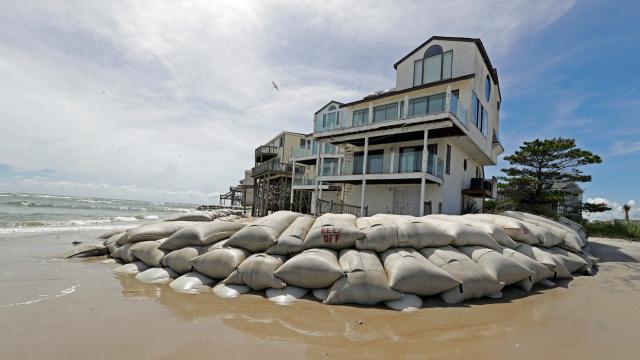Authorities are warning U.S. coastal residents in the path of Hurricane Florence to evacuate now or be at the mercy of the Category 3 storm, which is expected to slow upon hitting the coast of the Carolinas on Thursday and ravage the region with storm surge, rainfall, and flooding.
According to CNN, North Carolina Governor Roy Cooper told reporters that emergency personnel will not be able to intervene during the storm due to the high risk it poses. Florence is currently expected to begin delivering tropical storm-force winds in the region by early Thursday, escalating to hurricane-force winds by late Thursday or early Friday. CNN wrote:
“You put your life at risk by staying,” North Carolina Gov. Roy Cooper said. “Don’t plan to leave once the winds and rains start.”
Cooper and his South Carolina counterpart, Henry McMaster, told the more than 1 million people who have been told to leave that if they don’t, they are on their own.
McMaster told residents in some counties that emergency responders will be pulled from areas expected to be hit hard.
“Even the rescuers cannot stay there,” he said.
5 PM EDT Sept. 12: Here are the Key Messages for Hurricane #Florence. https://t.co/bculNU7eyB pic.twitter.com/eTl8amV0A8
— National Hurricane Center (@NHC_Atlantic) September 12, 2018
There is a high to moderate risk of flash flooding from #Florence across eastern North Carolina and extreme eastern South Carolina on Friday. @NWSWPC is forecasting more than 20″ of rain in some areas over the next week. https://t.co/krDhlpZ8LX pic.twitter.com/YhIH0JziC0
— National Hurricane Center (@NHC_Atlantic) September 12, 2018
Hurricane and storm surge warnings for #Florence remain in effect from South Santee River, South Carolina, to Duck, North Carolina, including Pamlico and Albemarle Sounds. Tropical storm force winds are likely to start along the NC coast Thursday morning. https://t.co/mQ5e78uj7a? pic.twitter.com/8m3iGPC2q5
— National Hurricane Center (@NHC_Atlantic) September 12, 2018
Accuweather reported that its meteorologists “believe that the hurricane will stall and meander near the Carolina coast from Thursday night to Saturday.” That means locals and their property could be punished with severe hurricane conditions for days, not hours. “Total innundation” is expected in eastern and southeastern North Carolina, as well as northern Southern California, and the storm surge could reach in “excess of 3.05m in some areas,” Accuweather added. Isolated tornadoes could also occur along North Carolina’s coast on Thursday, according to the National Weather Service in Wilmington.
Only seven major hurricanes have hit on the coast between Savannah, Georgia and Cape Hatteras, North Carolina since 1879, CNN reported, and the last was Hurricane Hugo in 1989. In that time the population has dramatically increased.
The Washington Post warned that the heavy rainfall expected is likely to be “catastrophic,” and noted the National Weather Service said Florence will likely be bad even by the standards of prior big storms:
“This will likely be the storm of a lifetime for portions of the Carolina coast,” the National Weather Service in Wilmington, N.C., wrote Tuesday, “and that’s saying a lot given the impacts we’ve seen from hurricanes Diana, Hugo, Fran, Bonnie, Floyd, and Matthew.”
As Earther has noted before, the path Florence has taken is incredibly unusual, with none of the 57 named storms that had passed within 322km of its position last week coming close to striking the U.S. coast. The expected stalling is equally unusual, according to USA Today:
Instead of roaring ashore and quickly heading inland and weakening, as most storms do, Hurricane Florence should instead “stall near the coast and then parallel southwestward toward Georgia,” Weather Channel meteorologist Greg Postel said. “I’ve never seen anything like this.”
AccuWeather meteorologist Marshall Moss said Florence’s track is unique. “It was located farther north in the Atlantic than any other storm to ever hit the Carolinas, so what we’re forecasting is unprecedented,” Moss said.
In other words, those living in coastal regions subject to evacuation orders in Florence’s path have had their final warning: Please, for your own good, get out of there before it’s too late. That means now.
[CNN]
